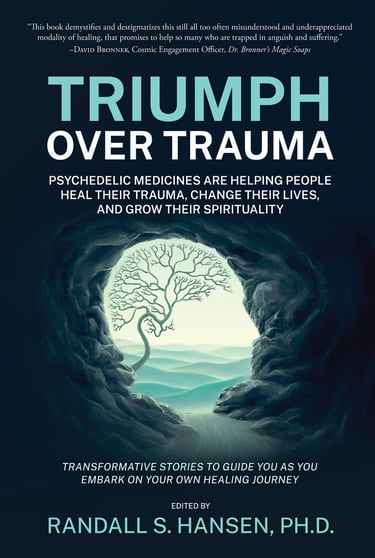Purge Your Pantry For Health and Healing
Don't let food marketers trick you. Most of the "food" they sell through your local supermarket is literally unhealthy junk food; eating it won't kill you today, but it will definitely reduce the length and quality of your life.
Think I am being overly reactive or alarmist? Please do your own research, including some of the sites listed at the end of this article, but there is no question that almost every person has too many unhealthy foods and ingredients lurking in their pantries.
Want better health and healing? You MUST change the type of food you buy, including examining whatever you have stored up in your pantry.
It's Long Overdue: Time to Purge Your Pantry
What evils lie in wait in the darkness of your pantry? What unhealthy ingredients, mixes, or "foods" sit on your shelves? Which items in your pantry offer empty calories while linked to serious health conditions and diseases?
If you're determined to start eating healthier, one of your first acts must be to purge your pantry of the many dangerously unhealthy items lurking quietly on your shelves. Which foods are the worst? Sadly, there are many basic ingredients and widely purchased foods that offer little or no nutritional value while exposing consumers to numerous health hazards that can contribute to long-term illnesses and diseases; these items used to be called "junk foods," but they actually fall into a class referred to as "hyperpalatable foods" -- foods that have been chemically manipulated to make them taste better, not fill you with anything more than calories, and get you addicted to buying more and more.
Here's a list of products to purge from your pantry in your pursuit of better health and wellness.
Refined Sugars. Processed, refined sugar -- whether the white granular or powered or brown sugar -- offers no health benefits while having proven negative side effects, including being linked to obesity, diabetes, and cancer.
The average person consumes more than a cup of added sugar daily -- in our snacks, sauces, cereals, fruit juices, sodas, and energy drinks.
Many nutrition experts report we consume so much of these sugary-goods because of sugar's addictive properties.
Start with getting rid of all your refined sugar, but you'll also need to read the ingredient labels of everything in your pantry to eliminate the vast amount of foods that are secretly sweetened with sugar.
Sugar consumption has been connected with an increase in multiple metabolic conditions, including diabetes, obesity, heart disease, inflammation, depression, as well as tooth decay.
White Flour and Cornstarch. A staple of baking for decades, sadly white flour breaks down into sugar (glucose) and can lead to the same problems caused by consuming processed refined sugars. In addition, the white part comes from a bleaching process in which the flour is stripped of nutrients and fiber, which is then enriched/fortified with additives.
It's not just the bleaching. The wheat grown in this country, with the vast majority of it grown from GMO-seed and grown in monoculture conditions that require lots of toxic chemicals, is a disgrace and danger to our food system. Some experts theorize that part of the growing gluten insensitivity is less a sensitivity to the gluten and more a sensitivity to the chemicals (such as Roundup) used on the crops.
You'll want to not only eliminate the bag of flour, but the many snacks and foods made with white flour, such as pasta, tortillas, bagels, and pretzels. Once eliminated from your pantry, replace these white flour products with products made with whole grain flour -- which contains more nutrients and fiber -- but even then, limit the amount of flour you consume as you should monitor your simple carbohydrate intake.
White Rice. Like white flour, white rice has been stripped of all nutritional benefits, leaving empty calories that wreak havoc with your blood sugar levels.
If you love rice, then at least replace the white rice with natural rice -- unaltered brown rice, which is a good source of fiber and contains nutrients like riboflavin, folate, magnesium, manganese, and zinc.
Even better, replace the rice with an extra portion of vegetables or fruits -- which provide more fiber and nutrients and fewer simple carbohydrates.
All Corn and Blended Vegetable Oil and Shortenings. Get rid of all the "vegetable" seed oils you use for cooking or baking. Corn, soy, cottonseed, canola, safflower, sunflower, and grapeseed oils are all produced in an industrial process that involves using toxic solvents and a bleaching process to arrive at the finished product.
These industrial oils are also rich in polyunsaturated fats (PUFAs), which have been linked to the creation of free radicals and weakening immune functions.
Depending on your needs, switch to better oils such as olive oil (cold-pressed), which is a monounsaturated oil rich in antioxidants; coconut oil, which offers a unique composition of fatty acids; or avocado oil, which is perhaps the best overall oil for its mild taste and as an excellent source of healthy fats and nutrients.
High-Fructose Corn Syrup (HFCS) Products. Seek out and eliminate all products that include this cheap sweetener and preservative made from cornstarch (produced by changing the glucose in cornstarch to fructose); it has been linked to obesity, diabetes, depression, and hypertension.
Fructose can be found in many (and some unexpected) products, including sodas and fruit drinks, sports drinks, fruit-flavored snacks, salad dressings, barbecue sauces, and breads. Replace these items with unprocessed foods, fresh fruits and fruit juices, and natural dressings and sauces.
Sugary Snacks and Cereals. If you've read this far, you know that all the cookies, toaster pastries, sugar smacks and snacks in your pantry have to go. Even conventional cereals, oatmeal, and granola are a no-go. These products are typically made with processed sugars and flours and have little nutritional value besides the vitamins they "fortify" the products with as a selling point to parents (and even the quality of the vitamins they use is in question).
These products are still empty calories that can lead to serious negative health issues -- diabetes, obesity, heart disease, inflammation, and tooth decay.
Remember that sugar has many names as an ingredient (and is often listed more than once), including dextrose, dextran, sucrose, fructose, galactose, glucose, lactose, maltodextrin, and maltose.
Processed High-Fat Foods, Mixes, and Prepackaged Meals. Whether the foods have saturated fats or trans fats or use hydrogenated oils, it's best to never eat them. Discard the cookies, crackers, chips, microwave popcorn, gravy mixes, premade meals, and all the rest.
Besides having other harmful ingredients, the worst ingredient in these products are the trans fats -- chemically altered saturated fat that shows up on the food labels as partially hydrogenated or hydrogenated oil. Hydrogenated fats are created when an oil has hydrogen added to it -- a process designed to extend the shelf life of the products that contain it.
Flavor-Enhanced Foods. Food marketers are some of the most creative folks working today, convincing people to buy products that are enhanced with chemical additives rather than natural flavorings. There's nothing inherently wrong with chemical flavorings for flavor enhancement, but why consume chemicals that taste like blueberry when you can go out and buy real blueberries and add them to your meals?
One company produces a guacamole dip that contains hydrogenated soybean oil and artificial green coloring -- and no actual avocado. Using real fruits and vegetables as ingredients offer much more than actual flavor, including various vitamins, minerals, and other nutrients -- and, of course, no potentially harmful chemicals... but they cost much more, which is why producers use the cheaper chemicals.
Final Thoughts on Purging Your Pantry of Unhealthy Stuff
A simple rule for examining your current food and for all future purchases: If it has more than five ingredients, don't buy it -- unless those ingredients are all pure, such as spices. If it uses artificial anything, don't buy it. If it lists ingredients you can't pronounce, don't buy it.
When purging your pantry of all the bad stuff, get rid of as much of it as you can afford to do. Obviously, one choice is to consume what you currently have and then replace it with the healthier options the next time you shop. And if you can afford to get rid of as much of the bad stuff as you can, instead of throwing it all away, consider giving unopened products to a local food bank or homeless shelter.
The key is changing your buying and eating patterns moving forward. Removing all the sugars and processed foods will have a major impact. Next, examine how often you eat out and where, because most fast foods (and other restaurants) use lower quality ingredients, including added sugars and seed oils.
Nutrition is a cornerstone of good health. And if you are currently on any medications, by simply changing your diet, you may be able to wean off one or more medications -- but always work with your doctor when doing so. (FYI, your doctor most likely knows very little about nutrition, as many doctors report receiving minimal training on nutrition in medical school.)
Purging Pantry and Healthy Foods Resources


Dr. Randall Hansen is an advocate, educator, mentor, ethicist, and thought-leader... helping the world heal from past trauma. He is founder and CEO of EmpoweringSites.com, a network of empowering and transformative Websites, including EmpoweringAdvice.com.
He is the author of the groundbreaking Triumph Over Trauma: Psychedelic Medicines are Helping People Heal Their Trauma, Change Their Lives, and Grow Their Spirituality and the well-received HEAL! Wholeistic Practices to Help Clear Your Trauma, Heal Yourself, and Live Your Best Life.
Dr. Hansen's focus and advocacy center around true healing ... healing that results in being able to live an authentic life filled with peace, joy, love. Learn more by visiting his personal Website, RandallSHansen.com. You can also check out Dr. Randall Hansen on LinkedIn.






